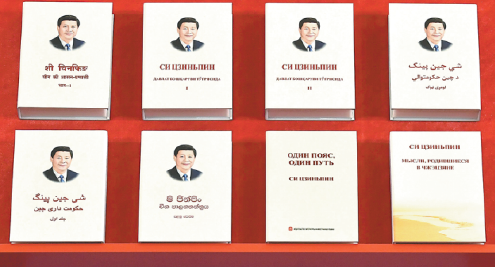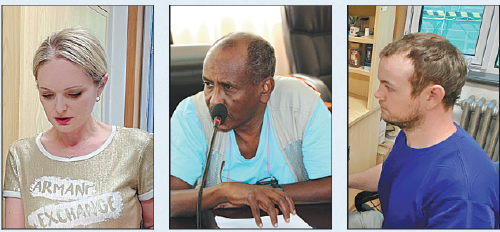FOREIGN TRANSLATORS HELP TELL NATION'S STORY TO WORLD
Overseas experts bridge differences in language, culture, social systems
Elena Kazanina, who comes from Russia, was excited and nervous when assigned the task of translating China's Government Work Report this year.
Although it was the first time she had taken part in translating the report, she said, "Fortunately, my colleagues and I got the job done very smoothly."
Kazanina is one of the experts working at the Institute of Party History and Literature of the Communist Party of China Central Committee. These experts are responsible for translating major Party and government documents into languages such as English, Russian, French, Spanish, Japanese, German and Arabic.
The institute translates the Chinese premier's Government Work Report, which reviews the past year and sets major tasks for the current year, ahead of the two sessions, the annual meetings of the nation's top legislature and leading political advisory body.
Kazanina said, "The way in which the Chinese government committed itself to lifting people out of poverty and promoting common prosperity left a deep impression on me."
The 46-year-old learned about Chinese culture for the first time when she read the Russian version of the classic work I Ching, or Book of Changes, in 1988, when she was 12.
"I was touched by the wisdom of ancient Chinese philosophy," Kazanina said. After entering college, her interest in Chinese culture and the Chinese language continued to grow, and in 2001, she moved to the country.
During her time in China, Kazanina has seen the nation's highspeed trains running at faster speeds, the economy growing rapidly, the air becoming clearer, workers earning more, and farmers harvesting more grain, among other improvements.
"When I was translating the Government Work Report, I realized the reason behind this progress is because the Chinese government and the CPC are adhering to the idea of going forward step by step," she said.
Translating Party documents dates to 1927, when one of Mao Zedong's best-known and most influential essays, the Report on an Investigation of the Peasant Movement in Hunan, was translated into Russian and English for publication in Communist International publications.
In 1961, a special agency responsible for translating Mao's works, the first of its kind, was established by the Central Compilation and Translation Bureau.
In 2018, in accordance with the plan to deepen reform of Party and State institutions, the bureau was merged with the Institute of Party History and Literature of the CPC Central Committee.
Liu Liang, a senior translator at the institute, said, "Since the 18th CPC National Congress in 2012, and particularly after 2018, the translation of important Party and government documents entered a period of rapid development featuring a wider scope of texts and diversified forms of translation."
In addition to the writings and works of President Xi Jinping and other leaders, the institute is responsible for translating documents for important Party and national events, such as the CPC national congresses and the two sessions, as well as material relating to the Party's history, rules and regulations, Liu said.
Opinion dominated
Gao Anming, vice-president and editor-in-chief of China International Communications Group, which took part in compiling and translating the book Xi Jinping: The Governance of China, said, "One of the reasons that many of China's achievements and policies are not known or understood by the world is because global public opinion is still largely dominated by the Western discourse system."
He said that instead of bridging different languages and cultures, the pride and prejudice of Western countries sometimes expands this gap.
"Translation is particularly crucial in telling China's story to the world by introducing the country's progress achieved in various fields, including the economy, science and technology, and culture," Gao said.
He added that it will be easier for foreigners to better understand why China chooses its own development path and system if this is explained in a language they are familiar with.
Yahia Mustafa, 65, from Sudan, was responsible for the Arabic translation of Xi's report to the 19th CPC National Congress in 2017. It was the first time that foreigners had been invited to take part in this work since the late 1970s.
"Allowing us to be directly involved in the translation shows the CPC's confidence, openness and transparency," Mustafa said.
He noticed that key concepts in the report, from "building a moderately prosperous society in all respects" to "building a community with a shared future for mankind" are aimed at putting the public interest above all else.
The distinctive feature of the Party is that it always puts people first and cares for and serves them, Mustafa said.
He also contributed to the Arabic version of Xi's On Building a Human Community with a Shared Future, a book that contains numerous Chinese idioms, proverbs, ancient poems and quotations.
Mustafa, who has lived in China for more than 20 years, said many Chinese expressions are closely related to the country's 5,000-year history and culture, so the implications behind these terms cannot become clear if they are directly translated word by word.
"We need to gain a thorough understanding of them before delivering the meaning in a different language, so when translating the book, I tried to use a lot of annotations to better explain expressions that cannot be easily understood," he said.
Sean Slattery, who comes from Ireland and was involved in translating Xi's speech at a ceremony marking the CPC's centenary on July 1, cited an example of why it is necessary to consider the features of both Chinese and the target language in translation work.
In the speech, Xi said, "Anyone who would attempt to do so (allow bullying, oppression or subjugation by any foreign force) will find themselves on a collision course with a great wall of steel forged by over 1.4 billion Chinese people."
Slattery said, "However, some foreign media outlets simply translated the Chinese word by word, so that 'find themselves on a collision course' turned out to be 'get their heads bashed bloody'. In this way, the translation didn't accurately deliver the meaning in Chinese."
He added that the translation of Party and central government documents is becoming increasingly important, as is the role played by China on the world stage, because foreigners increasingly need to know about the nation's policies and its governance experience, such as the fight against poverty.
China has lifted about 770 million people out of poverty since the reform and opening-up policy was launched in the late 1970s. The poverty alleviation campaign, reinforced after the 18th CPC National Congress in 2012, lifted 98.99 million impoverished people in rural areas out of extreme poverty.
Frankfurt debut
In 2014, Xi Jinping: The Governance of China, which records the thoughts and practices of Xi and the central leadership, debuted at the Frankfurt Book Fair in Germany, where it was available in nine languages, including Chinese, English, French and German.
The second and third volumes of the book were published in a number of languages in 2017 and 2020 respectively.
In November, the Malay edition of the book's first volume was launched in Kuala Lumpur, the Malaysian capital. To date, the first volume has been translated and published in 36 languages.
Former French prime minister Jean-Pierre Raffarin, a loyal reader of the series, said in an article: "I read the book with keen interest, as it expounds on China's development philosophy and reveals political aspirations, the concept of governance and Xi Jinping's great planning. In a nutshell, Xi Jinping: The Governance of China is a good book worth reading."
One reader who bought the English-language version of the first volume, described the book on the Amazon website as, "An insightful explanation of how China has achieved its economic and social changes efficiently on such a massive scale."
Gao, from China International Communications Group, said the translation of leaders' works and Party and government documents is part of the Chinese political discourse, which is distinctive for its characteristics and is highly concise.
"This is why we need advice from foreign experts to help bridge the differences in terms of languages, cultures and social systems in order to present Chinese ideas to foreign readers in a way they can understand," he said.
Gao, also executive vice-president and secretary-general of the Translators Association of China, said that in April, the association for the first time awarded seven foreign experts for their outstanding contributions to translation work in China.
"In the future, the association will encourage more foreign experts to engage in translating Chinese into foreign languages to tell the China story well to the world," Gao added.
He said that as China's national strength and influence overseas continue to gain momentum, the international community is looking forward to hearing the nation's voice and proposals more than ever before.
"If, in the first place, we can provide translated versions of important political discourses that may raise considerable concern in the international community, this will reduce the chances of China's development strategy being misjudged," he said.
In November, the 19th CPC Central Committee convened its sixth plenary session, which drew widespread attention at home and overseas, as it passed a landmark resolution that charted a path to the future.
As the plenary session concluded on Nov 11, translated versions of the communique from the meeting were issued in 10 languages at the same time as the Chinese version.
Foreign-language versions of the resolution's full text and an explanation of the resolution made by Xi were also available on Nov 16, when a Chinese version was also released.
Zhang Shiyi, director of the Institute of Party History and Literature's translation division, said, "It took us only eight days to translate the three documents, which contain more than 50,000 Chinese characters.
"Only when translated expressions are coherent and the meaning is correctly delivered, will the international community be able to understand China as well as the ideas and propositions of the CPC," Zhang said.
mojingxi@chinadaily.com.cn

LI HE/XINHUA
President Xi Jinping's works are published in a variety of languages.

CHINA DAILY
From left: Elena Kazanina from Russia, Yahia Mustafa from Sudan, and Sean Slattery from Ireland are among the experts working at the Institute of Party History and Literature of the Communist Party of China Central Committee responsible for translating major Party and government documents.















